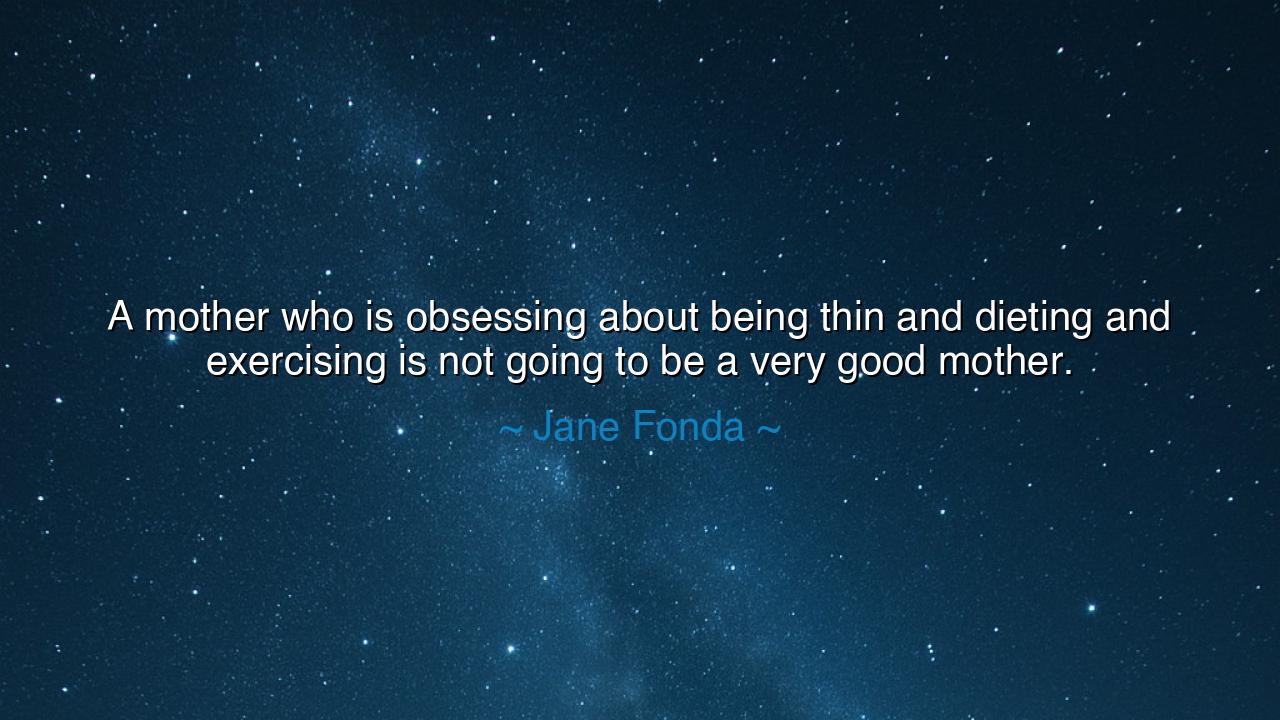
A mother who is obsessing about being thin and dieting and
A mother who is obsessing about being thin and dieting and exercising is not going to be a very good mother.






The words of Jane Fonda — “A mother who is obsessing about being thin and dieting and exercising is not going to be a very good mother.” — carry a profound and timeless insight into the balance of self-care, priorities, and the responsibilities of motherhood. Beneath the modern phrasing lies an ancient truth: that a preoccupation with vanity, obsession, or self-image, when it eclipses attention to one’s children, diminishes the nurturing and guidance a mother can offer. Fonda’s observation is not a judgment of health or fitness, but a meditation on focus, presence, and the emotional bandwidth required to raise children well.
Her words illuminate the principle that a mother’s attention shapes the emotional and moral development of her children. The ancients recognized that the household was the first school of virtue. Plato and Aristotle both emphasized that a child’s moral character and emotional stability depended upon the virtues modeled by their parents. A mother consumed by external appearances, however, may fail to cultivate patience, empathy, and presence, leaving children with guidance that is incomplete or distracted. True motherhood, as Fonda implies, requires balance: the ability to care for oneself without allowing self-obsession to erode care for others.
This reflection also addresses the modern pressures on women to conform to idealized standards of beauty. Jane Fonda, whose life has often intersected with public scrutiny, understands the danger of letting external expectations dictate internal priorities. Obsession with appearance can become a form of distraction or anxiety, drawing a mother’s energy away from the patient, consistent attention that children need. Ancient texts, from the Stoics to Confucian teachings, remind us that virtue and focus on duty outweigh superficial concerns. Fonda’s observation carries forward this wisdom: children require emotional availability more than aesthetic perfection.
Consider the historical example of Queen Victoria, who, despite her prominence, prioritized her children’s upbringing and moral education over the demands of courtly fashion or vanity. Her guidance, presence, and moral authority shaped a generation of heirs and influenced European history. Her life demonstrates that the character and attention of a mother carry far more weight than the fleeting obsession with appearance, confirming Fonda’s assertion in a broader, enduring context.
Fonda’s statement also conveys the subtle truth that obsession can create an emotional barrier between mother and child. A mother consumed by self-image may project insecurities, anxieties, or dissatisfaction onto her children, consciously or unconsciously. This can impair their confidence and emotional development. The ancients understood that the virtues and vices of a parent ripple outward: Plato’s ideal city was built upon the moral integrity of its guardians, and Confucius taught that the home is the first arena where virtue is both taught and modeled. In modern life, the lesson remains unchanged: presence, mindfulness, and balanced priorities are essential to healthy parenthood.
Her observation also invites reflection on self-love and moderation. To be a good mother does not require neglecting oneself; rather, it requires that self-care serve the purpose of sustaining one’s capacity to nurture. A mother who balances attention to health with attention to her children models discipline, moderation, and care for self and others simultaneously. Historical figures like Florence Nightingale, who dedicated herself to care while maintaining rigorous personal discipline, embody this principle: focus, service, and moderation together create influence and positive outcomes.
From Fonda’s insight emerges a lesson for all parents: prioritize presence, emotional availability, and engagement over obsession with external appearance or personal vanity. To be consumed by self-image can distract from the sacred duties of guidance, nurture, and moral instruction. By cultivating balance, parents can offer children the attention, care, and wisdom necessary for them to grow into resilient, compassionate adults.
Thus, Jane Fonda’s words endure as both caution and teaching: motherhood demands more than perfection in appearance — it requires presence, devotion, and the disciplined allocation of energy to the growth and well-being of one’s children. In embracing this principle, mothers cultivate not only the strength of their children but the enduring virtues of love, attention, and moral guidance — gifts that last across generations.






AAdministratorAdministrator
Welcome, honored guests. Please leave a comment, we will respond soon